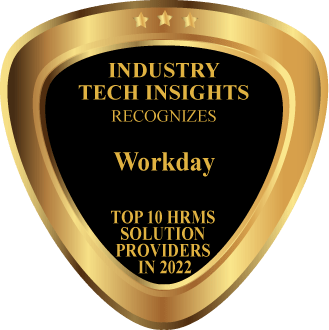
- February 17, 2026 12:27 pm
- California

When it’s necessary for Target to connect to other vendors’ systems, Workday provides the tools to build and modify integrations and validate results. The same test environments can be used to evaluate software updates. Dana Klein, director of technology at Target, says, “Workday provides the foundation, flexibility, and speed we need in an HR software partner.”
Workday is a leading provider of enterprise cloud applications for finance and human resources, helping customers adapt and thrive in a changing world. Workday applications for financial management, human resources, planning, spend management, and analytics have been adopted by thousands of organizations around the world and across industries — from medium-sized businesses to more than 50% of the Fortune 500.
Target also uses the Workday platform to efficiently communicate with team members. Workday notification prompts and a centralized document platform enable efficient information sharing throughout Target. Klein explains, “We configured Workday capabilities to notify thousands of team members simultaneously about wage increases and alert them to update their contact information. We also paused and rescheduled educational campaigns for both headquarters and in-store team members so they were aware of the latest details about remote work arrangements.”
Another impactful element is the ability for Target team members to access helpful information and manage processes on their own. “Workday provides team members with great self-service capabilities and the visibility to perform transactions on their own. Speeding up these processes means our team members can spend more time delivering an exceptional guest experience,” Klein says.
Target also uses the Workday platform to efficiently communicate with team members. Workday notification prompts and a centralized document platform enable efficient information sharing throughout Target. Klein explains, “We configured Workday capabilities to notify thousands of team members simultaneously about wage increases and alert them to update their contact information. We also paused and rescheduled educational campaigns for both headquarters and in-store team members so they were aware of the latest details about remote work arrangements.”
Another impactful element is the ability for Target team members to access helpful information and manage processes on their own. “Workday provides team members with great self-service capabilities and the visibility to perform transactions on their own. Speeding up these processes means our team members can spend more time delivering an exceptional guest experience,” Klein says.
Target is just one of the hundreds of companies that have benfitted with the Workday platform.
The Next $5 Billion
Talking to Bob Evans of Acceleration Economy, Aneel Bhusri, co-founder and co-CEO at Workday stated Preparing to deliver an onslaught of new products to meet the emerging needs of customers, Workday executives last week laid out ambitious plans to jump from this year’s $5 billion in revenue to $10 billion within the next four years.
That $10 billion number comes with some ambitious goals. In a slide titled “Our Aspiration,” Workday listed these two wide-ranging objectives:
“Leader in HCM Across Industries”
“Leader in Financial Management [in] Services-Based Industries”
And to add that next $5 billion in revenue, said chief strategy officer Pete Schlampp, Workday is pursuing four strategic growth initiatives:
Catalyzing that growth, Schlampp said, will be a dramatically accelerated product-development agenda that will result in Workday, this year, more than doubling the number of packaged solutions. While it currently has 15—including Proof of Vaccination, ESG Social Analytics, and Healthcare Demand Planning—Workday will launch 20 new solutions in FY23 (ending Jan. 31, 2023), including Return to Work Sentiment, Attrition Analytics, and ESG Supplier Sustainability.
Plus, without disclosing many details, Schlampp outlined on broad strokes Workday’s intentions to become much more aggressive in the industry-cloud category. He cited Workday’s intentions to participate in that red-hot category with products, partners, implementations, solutions, integrations, packaging, and thought leadership.
Those future growth plans sit on top of an impressive foundation that Workday has built within its current global base of customers:
Acquisitions will also play a part in fueling Workday’s growth, Bhusri said, citing the massive category of payments as one opportunity. Noting that all the major payment companies have contacted Workday about some sort of partnership, Bhusri said, “A year from now, if we haven’t done something [M&A] in the payments space, I’m going to be disappointed.”
Bhusri cofounded Workday 17 years ago with former CEO and chairman Dave Duffield, and several months ago elevated global sales leader Chano Fernandez to the co-CEO role. That arrangement, Bhusri has said, has given him more latitude to drive product strategy and innovation, which is clearly reflected in some of the anecdotes cited above.
Mentioning that Workday will almost certainly join the Fortune 500 within the next year, Bhusri said, “We’re now 17 years into the cloud, and our growth rate is highest than it’s been in several years.”
Here’s a quick set of numbers that underscores Bhusri’s point about accelerating growth:
Asked if the cloud would at some point go the way of earlier IT architectures that were replaced by superior technology, Bhusri said, “The cloud is like the electricity grid: it’s the right architecture and it’s going to remain that for a very long period of time.
“It’s more robust than traditional IT, it’s more secure than legacy systems, and over time it’s more cost-effective.”
“Workday had a strong first quarter, building on the fiscal 2022 acceleration of our business,” said Bhusri. “I’m confident in our opportunity ahead and the enduring growth of Workday. Our focus remains on cultivating our culture, while driving innovation across finance and HR, and expanding the value we bring to some of the world’s largest organizations.”
Driving Social and Sustainability Initiatives
Workday recently announced new solutions and expanded capabilities to help its global customers meet the demands of evolving environmental, social, and governance (ESG) regulations and corporate accountability. Two new solutions – social reporting for ESG and supplier risk and sustainability – will complement the company’s current product portfolio, which already supports ESG goals with belonging & diversity solutions, sustainable sourcing, compliance training, pervasive audit and internal controls features, and planning and analysis of ESG data.
Organizations worldwide are facing mounting regulatory pressure, such as the new standards recently proposed by the SEC in the U.S. and European Financial Reporting Advisory Group (EFRAG) in the EU, as well as growing interest and demand from investors and other stakeholders for businesses to adopt sustainability strategies and best practices. As a result, Workday is expanding its ESG offerings to continue helping customers gain visibility and insight into data that is critical to meet current and developing ESG requirements.
Additionally, Workday is enabling its broader ecosystem — including customers, partners, and the wider developer community — to deploy and adopt new ESG capabilities by using open standards and technologies to build extended solutions on the Workday platform, helping to support global customers’ ESG initiatives across regions and industries.
Harnessing ESG Data with a Flexible Platform
Workday offers a flexible platform that helps enable customers and partners to adapt as ESG regulations continue to develop. As a source of truth for two key components of ESG reporting and compliance – worker and supplier data – Workday is uniquely positioned to support customers as they evolve their social, corporate responsibility, and sustainability efforts to meet disclosure requirements, helping them track how they’re progressing toward goals.
With the ESG imperative more pressing than ever before, Workday is building on its existing offerings by continuing to innovate to help its global customers accelerate and expand their ESG efforts with:
Streamlined Workforce Reporting to Measure ESG. To track progress against goals and identify areas for improvement, the new social reporting for ESG solution provides a dashboard that consolidates information around workforce composition, organizational health, diversity, and workforce investment from Workday HCM. For example, customers can quickly see their worker breakdown by metrics like age, race/ethnicity, and veteran status and understand how they are compensating different employees, including base/bonus breakdown and benefit enrollment. Additional data from Workday People Analytics (including VIBE Index), Workday Peakon Employee Voice, and Workday Learning can further enhance an organization’s efforts around the social component of ESG, including helping customers seamlessly track the progress of their social initiatives and take action to drive change.
Increased Access to Data to Help Select Sustainable Suppliers. The Workday supplier risk and sustainability solution will help customers improve the sustainability and resilience of their supply chains and enable them to assess Scope 3 emissions – carbon emissions beyond a company’s direct operation and utility (electricity, steam, heat, or cooling) use. Using Workday Financial Management, Workday Prism Analytics, and Workday Strategic Sourcing, the new solution will enable the collection of key ESG and risk data from suppliers, identification of areas for improvement, and reporting on Scope 3 emissions from suppliers, such as transportation, distribution, and capital goods. Workday customers will be able to source and track supplier data that can then be considered when making supplier selections to comply with their ESG goals.
Tailored Solutions from Partners Built on Workday. Workday offers an adaptable platform that enables companies to manage their emissions reduction strategy. Accelerate2zero – built by Deloitte on Workday Adaptive Planning – enables organizations to capture Scope 1 emissions (direct emissions from a corporation, such as facilities or company vehicles), Scope 2 emissions (indirect emissions associated with the purchase of electricity, steam, heat, or cooling) and Scope 3 emissions, such as business travel, materials and waste, and value chain emissions. The solution enables companies to undertake a cost benefit analysis of emission abatement options and enables dynamic emissions budget management, helping organizations to achieve the emissions targets within their ESG strategy.
The social reporting for ESG solution is available today and the supplier risk and sustainability solution will be available later in 2022 at no additional cost to Workday customers. The Accelerate2zero solution is available today from Deloitte for use in countries that have calculated their emission factors and have made them publicly available.

" Our focus remains on cultivating our culture, while driving innovation across finance and HR, and expanding the value we bring to some of the world’s largest organizations "
Aneel Bhusri
Co-Founder, Co-CEO, & Chairman